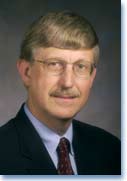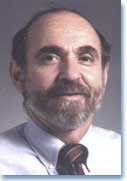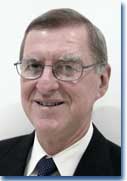RSNA Press Release
RSNA Announces Honored Lecturers and Topics of Annual Orations
Released: December 1, 2003
|
Media Contacts: |
Heather Babiar or Maureen Morley | (630) 590-7762 |
| Heather Babiar (630) 590-7738 hbabiar@rsna.org |
Maureen Morley (630) 590-7754 mmorley@rsna.org |
CHICAGO, Dec. 1, 2003 — Each year, three distinguished researchers are selected to deliver honored lectures during the Scientific Assembly and Annual Meeting of the Radiological Society of North America (RSNA). The honored lecturers for RSNA's 89th Assembly are Francis S. Collins, M.D., Ph.D., Bethesda, Md.; Donald L. Resnick, M.D., San Diego; and Lester Peters, M.D., Melbourne, Australia.
Oration topics this year are "The NIH Roadmap," "Internal Derangements of Joints: Anatomic-Pathophysiologic Imaging Correlation" and "The Invaluable Role of PET in Radiation Oncology."
Eugene P. Pendergrass New Horizons Lecture
Dr. Collins, director of the National Human Genome Research Institute at the National Institutes of Health (NIH), will speak on "The NIH Roadmap." Dr. Collins led the successful effort to complete the Human Genome Project (HGP), a complex, multidisciplinary scientific enterprise directed at mapping and sequencing all of the human DNA, and determining aspects of its function.
A working draft of the human genome sequence was announced in June 2000, an initial analysis was published in February 2001, and a high-quality, reference sequence was completed in April 2003. From the outset, the project ran ahead of schedule and under budget, and all the data is now available to the scientific community without restrictions on access or use.
Dr. Collins received a B.S. from the University of Virginia, a Ph.D. in physical chemistry from Yale University, and an M.D. from the University of North Carolina. Following a fellowship in human genetics at Yale, he joined the faculty at the University of Michigan, where he remained until moving to NIH in 1993. His research has led to the identification of genes responsible for cystic fibrosis, neurofibromatosis, Huntington's disease and Hutchison-Gilford progeria syndrome. He was elected as a member of the Institute of Medicine in 1991 and to the National Academy of Sciences in 1993.
Annual Oration in Diagnostic Radiology
"Internal Derangements of Joints: Anatomic-Pathophysiologic Imaging Correlation" is the title of Dr. Resnick's lecture. Dr. Resnick, an internationally renowned researcher, author and lecturer on musculoskeletal imaging, will explain the complexity of the synovial-type joint and why dysfunction or derangement of such a joint is a common clinical problem that often requires analysis through imaging, especially MR imaging.
For more than 30 years, Dr. Resnick has been a professor of radiology at the University of California, San Diego. He has graduated nearly 200 fellows in musculoskeletal imaging—most of whom have assumed an academic position. Dr. Resnick is also chief of musculoskeletal imaging at the Veterans Administration Medical Center and a clinical associate at Scripps Clinic in San Diego.
A prolific researcher, Dr. Resnick is author or coauthor of more than 800 articles, 72 book chapters and 15 books. He has delivered more than 34 national and international named lectures and has won numerous honors and awards.
An RSNA member since 1981, Dr. Resnick was a member of the Refresher Course Committee and the Public Relations Committee.
The Annual Oration in Diagnostic Radiology is dedicated to Isaac Sanders, M.D.
Annual Oration in Radiation Oncology
"The Invaluable Role of PET in Radiation Oncology" is the topic of Dr. Peters' lecture, which will illustrate the value of positron emission tomography (PET) in defining disease extent, planning radiotherapy and monitoring therapeutic response in patients receiving definitive (chemo)radiotherapy for non-small cell lung cancer and for loco-regionally advanced squamous cell carcinoma of the head and neck. He will then preview potential new applications of this technology.
Dr. Peters is best known clinically for his expertise in the treatment of head and neck cancers. For more than a decade, Dr. Peters was a professor of radiotherapy and chairman of the Department of Radiotherapy at the University of Texas M.D. Anderson Cancer Center in Houston. He is currently a professor of radiation oncology at the Peter MacCallum Cancer Institute and the University of Melbourne. He is Dean of the Faculty of Radiation Oncology of the Royal Australian and New Zealand College of Radiologists.
He is a past-president of the American Society of Therapeutic Radiology and Oncology, and is the recipient of many international honors and awards, including this year's ASTRO Gold Medal. He has been president of two major congresses recently held for the first time in Australia—the International Congress of Radiation Oncology (2001) and the International Congress of Radiation Research (2003).
Radiation Oncology is dedicated in memory of Jerzy Einhorn, M.D., R.N.O., and Nina Einhorn, M.D., Ph.D.
RSNA is an association of more than 35,000 radiologists, radiation oncologists and related scientists committed to promoting excellence in radiology through education and by fostering research, with the ultimate goal of improving patient care. The Society is based in Oak Brook, Ill.
 |
 |
 |
Dr. Collins |
Dr. Resnick |
Dr. Peters |
# # #
 PDF
PDF